#David Pietrusza
Note
So, sorry to bother but, are there absolutely any books you could recommend on Theodore Roosevelt? I plan to read The River Of Doubt: Theodore Roosevelt's Darkest Journey, but have already read Mornings On Horseback + the entire Edmund Morris trilogy 1-3.
So outside of those books (+ A Bully Father, forgot to mention), are there any you could recommend? If not that's fine!
You're off to a great start! In my opinion, you've already checked off the best of the bunch with Edmund Morris's trilogy (The Rise of Theodore Roosevelt; Theodore Rex; and, Colonel Roosevelt). David McCullough's Mornings On Horseback would have been right at the top of my recommendations, as well. I'd also suggest picking up T.R.: The Last Romantic (BOOK | KINDLE) by H.W. Brands.
The Bully Pulpit: Theodore Roosevelt, William Howard Taft, and the Golden Age of Journalism (BOOK | KINDLE) by Doris Kearns Goodwin is excellent, and also explores the fascinating relationship between TR and his hand-picked successor (and eventual bitter rival during the 1912 campaign), William Howard Taft.
The relationship and rivalry between Theodore Roosevelt and Woodrow Wilson during TR's post-Presidency and World War I is also a captivating subject and the focus of two other great books: The Warrior and the Priest: Woodrow Wilson and Theodore Roosevelt by John Milton Cooper Jr., and TR's Last War: Theodore Roosevelt, the Great War, and a Journey of Triumph and Tragedy (BOOK | KINDLE) by David Pietrusza.
You mentioned that you're planning to read Candice Millard's The River of Doubt: Theodore Roosevelt's Darkest Journey (BOOK | KINDLE) and that's definitely another book I would have suggested. PBS's American Experience also made a great documentary called Into the Amazon about that dangerous trip by Roosevelt. Another really good book about Theodore Roosevelt's post-Presidency and final years before his death is When Trumpets Call: Theodore Roosevelt After the White House (BOOK | KINDLE) by Patricia O'Toole.
There are scores of great books about TR because he was an endlessly fascinating character, so I'm undoubtedly forgetting to mention a bunch of books that I'd strongly recommend, but hopefully this helps. As I mentioned, I think the Edmund Morris trilogy is the definitive work on Roosevelt's life, so you've got a solid foundation already.
#History#Books#Theodore Roosevelt#President Roosevelt#TR#Presidents#Presidential History#Book Suggestions#Book Recommendations#Books About Presidents#Theodore Roosevelt Books#Edmund Morris#Patricia O'Toole#Candice Millard#David Pietrusza#H.W. Brands#David McCullough#John Milton Cooper Jr.#Doris Kearns Goodwin#Politics#Presidential Politics
15 notes
·
View notes
Text


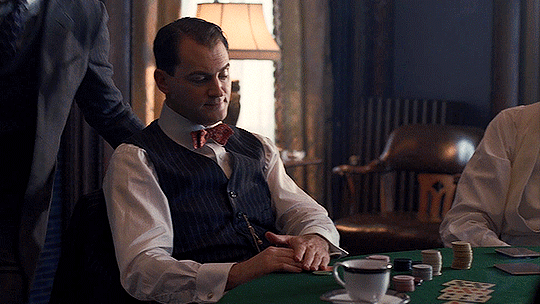

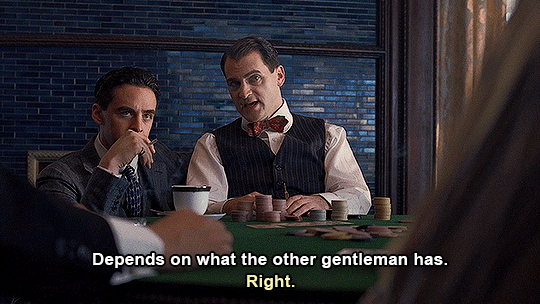
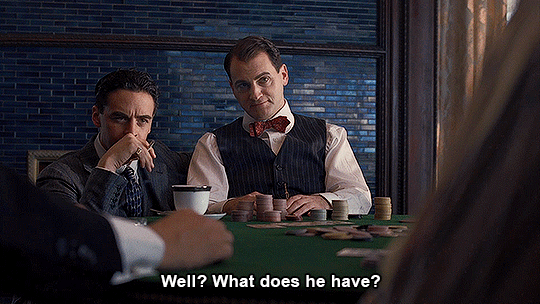

“He taught me how to dress,” said Luciano, “how not to wear loud things but to have good taste; he taught me how to use knives and forks, and things like that at the dinner table, about holdin’ a door open for a girl, or helpin’ her sit down by holdin’ the chair. If Arnold had lived a little longer, he could’ve made me pretty elegant; he was the best etiquette teacher a guy could ever have—real smooth.” | ‘Rothstein’ by David Pietrusza
Boardwalk Empire, “Broadway Limited”, s1x03
#Boardwalk Empire#boardwalkedit#Charlie Luciano#Arnold Rothstein#perioddramaedit#tvedit#userbbelcher#userstream#tvfilmsource#usertelevision#tvfilmspot#filmtvcentral#tvmoviegifsdaily#filmtvdaily#cinematv#smallscreensource#dailytvfilmgifs#photoshopped by me#be gifs#tv gifs#be s1x03
124 notes
·
View notes
Text
only partially through the 4th chapter but man is rothstein by david pietrusza amazing


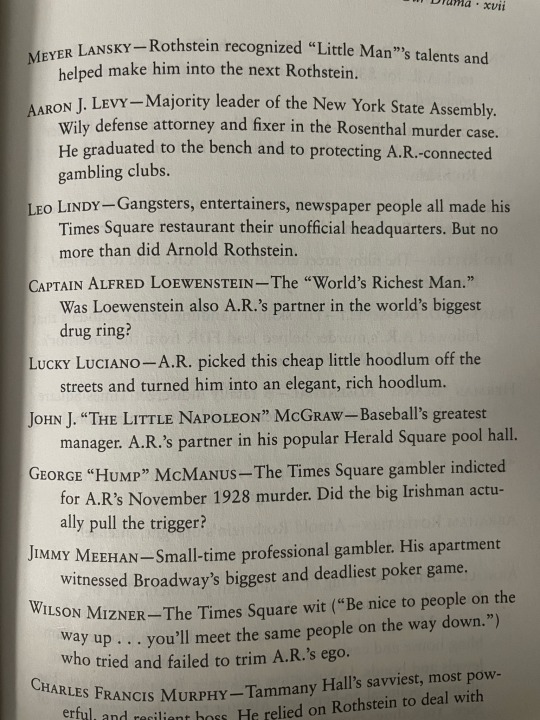
#gangster history#gangster book club#arnold rothstein#the money betting thing sounds fun#but i would never *actually* risk money on that#bc you know whoever says you should totally do money betting has like the perfect serial number#elegant rich hoodlum#charlie luciano
15 notes
·
View notes
Text
A couple days ago, I was reading Rothstein by David Pietrusza ( if you want to read a biography on Arnold Rothstein, i highly recommend this book )
and there was a guy who was mentioned and he was like the secretary of The Jockey Club ( it is or was a horseracing club ).
This guy's name was, i kid you not: Algie Dangerfield
3 notes
·
View notes
Text

Decided to go over the books I’ve picked up or have been reading, just because I’m in a good mood and classes start in a week so best not squander my time and actually read stuff! These are all nonfiction because for some reason I’m just not very interested in fiction books, I tend to read that sort of stuff online, and instead buy books to learn about stuff I wouldn’t from Wikipedia.
Now, without further ado:
American Prometheus by Kai Bird and Martin J. Sherwin;
I watched Oppenheimer recently, and I liked the movie, pretty good, so my Mom decided to buy this book because she thought I’d be interested considering I like biographies. I haven’t read it so far, and honestly I don't know if I will because I have several other biographies that I already have to read that are about people I’m interested in a bit more. I already watched the movie as well. Still, it should be interesting, maybe around a year or so down the line when I’ve forgotten the movie.
Homage to Catalonia by George Orwell (AKA Eric Blair);
I’ve already read 1984 and Animal Farm as part of the American Education System, so I thought to myself “why not read Orwell’s (maybe) third most famous book?” So I picked this up at the bookstore recently, and I haven’t started it yet, but it should provide an interesting look into both Orwell himself, and into the Spanish Civil War and how that whole ordeal went down. Not too much to say about this one because I obviously haven’t read it yet, but hopefully it’s interesting.
Shanghai by Harriet Sergeant;
The Warlord era of China was a period from 1916 to 1928 where China basically fell apart, which was followed by the Nanjing Decade where the KMT gained power. These periods of Chinese history are some of my most favorite to read about, because of just how interesting it is to me, and I picked this book up so that I could read more about the era. There weren’t any books solely on the Warlord era, and in the future, I hope to get a book on Chen Jiongming or Yan Xishan, but for now, I’ll settle on this.
Painting as a Pastime by Winston Churchill;
By far the smallest book I’ve obtained recently, this is a very short book by Churchill that details his interests in painting. My mom picked this up for me because she thought I’d be interested in it. I have painted a few things, although I prefer filling in the colors rather than drawing something out, but who knows, maybe Churchill was like Bob Ross in a way? I’ll have to read this soon, as it should be an easy thing to knock out quickly.
How to Survive History by Cody Cassidy;
I picked this up in a bookstore upstate because I thought it looked interesting and was similar to a few XKCD books that I own. The book is a semi-humorous detail of roughly how to survive several historic events, which I should keep in handy when I get my physics degree, in case I somehow violate most of the standard model. Haven’t read it yet, but it’s a smaller book and not exactly a feature length biography so I should be able to pick it up sometime and read through it.
We Had a Little Real Estate Problem by Kliph Nesteroff;
I also got this upstate in the same bookstore because I was drawn to the analysis of Native comedy. The book goes over the history of comedy amongst Native Americans, the nature of Native comedy (lots of dark humor in my experience), and also how we tend to be sidelined by much of popular culture due to the low amounts of us, meaning that we aren’t a very big demographic to focus on unfortunately. Also because of racism, because people were historically (and currently tbh) kinda racist against us, who’da thought? But seriously folks, I like comedy, I like the Indians, should be an interesting book. Little on the longish side, so maybe I’ll spend a few days in between larger books to read this one. Maybe it can me give tips on how to break out into comedy, you know?
Roosevelt Sweeps Nation by David Pietrusza;
I visited the FDR library while upstate, and I picked up this book there. The book details the 1936 presidential election, one of the most lopsided in American history. Now then, I’m a U.S. election nerd, I like this kind of stuff, so this is exactly up my alley. Reading about FDR and the decisions made on the campaign trail and what he did and also what Landon did, this is my bread and butter. The book’s somewhat large, so I’ll have to figure out what books I want to read before and after this one, but it should be interesting at least.
The Years of Lyndon B. Johnson: The Path to Power by Robert Caro;
This book is a huge book that I picked up… somewhere, I don’t actually remember. Regardless, this book is a biography of LBJ, kinda good, kinda bad president of the U.S.A. I find LBJ to be a fascinating politician because of how high his highs were, and how low his lows were. This book goes into detail about his early life up until his first bid for Senate. This is actually just the first volume in a 4 (soon to be 5 [hopefully]) volume set, of which I actually own all the rest. I don’t even know if I’ll be able to read all of these volumes, but it should be interesting. Currently reading this one right now, kind of the only book I am reading right now actually. So far I learned that the Apache one time tricked the Spanish into building a fort in the middle of nowhere claiming they wanted to convert, only for the fort to get sacked by the Comanche. Pretty smart.
On His Own Terms: A Life of Nelson Rockefeller by Richard Norton Smith;
I visited Nelson Rockefeller’s house during my trip upstate, and so I decided to pick up this biography on him there. His house was actually much more interesting than I anticipated, first because of all the modern art lying around (of which I’m a pretty big fan), and because our tour guide was actually very invested in the place, so I enjoyed listening to him talk about it. Highly recommend. Anyways, Nelson Rockefeller was an interesting guy, last of the liberal Republicans, maybe could’ve saved Humphrey in `68 if he wanted to, may have died because he had sex with his mistress (happens to the best of us). Overall, interesting dude, and I will admit I don’t know many details of his life, so hopefully this book can shed light on it. I think I’ll plan to read this after I finish at least volume 1 of LBJ.
Also, I didn't pick this book up because I couldn't find it, but I do hope to get Fear and Loathing: On the Campaign Trail '72 by Hunter S. Thompson soon. Talks about 1972 election, and Thompson's a pretty funny guy to read, even if he is a little, you know, weird. Hopefully I can get it soon!
Anyways, that’s all the books I’ve gotten in the past ~2 months or so, hope this inspires others to pick up these books and give them a try! Also I'll take book suggestions, don't know if I'll be able to get to any of them, but suggestions are appreciated :)
0 notes
Text
Presidential historian on the significance of world leaders attending royal funerals
Presidential historian on the significance of world leaders attending royal funerals
Presidential historian David Pietrusza weighs in on the legacy of Britain's longest-reigning monarch following her death on 'Your World.'
#yourworld #queenelizabeth Subscribe to Fox News! https://bit.ly/2vBUvAS
Watch more Fox News Video: http://video.foxnews.com
Watch Fox News Channel Live: http://www.foxnewsgo.com/ FOX News Channel (FNC) is a 24-hour all-encompassing news service delivering…
youtube
View On WordPress
0 notes
Link
history of audiobooks : 1948 by David Pietrusza | History
Listen to 1948 new releases history of audiobooks on your iPhone, iPad, or Android. Get any BOOKS AUDIO by David Pietrusza History FREE during your Free Trial
Written By: David Pietrusza
Narrated By: Jeff Cummings
Publisher: Brilliance Audio
Date: November 2018
Duration: 18 hours 0 minutes
#1948: Harry Truman's Improbable Victory and the Year That Transformed America#1948 Audiobook#Audiobook#History#David Pietrusza#Jeff Cummings
0 notes
Link
history of audiobooks : 1960 by David Pietrusza | History
Listen to 1960 new releases history of audiobooks on your iPhone, iPad, or Android. Get any AUDIOBOOK by David Pietrusza History FREE during your Free Trial
Written By: David Pietrusza
Narrated By: Jeff Cummings
Publisher: Brilliance Audio
Date: November 2018
Duration: 19 hours 0 minutes
#1960: LBJ vs. JFK vs. Nixon--The Epic Campaign That Forged Three Presidencies#1960 Audiobook#Audiobook#History#David Pietrusza#Jeff Cummings
0 notes
Text
What’s on my iPod March 4 2019
So I love me some audio books so here’s a run down of what’s on my iPod right now
Non-Fiction:
The Color of Law: A Forgotten History of How Our Government Segregated America by Richard Rothstein
Embers of War: The Fall of an Empire and the Making of America's Vietnam by Fredrik Logevall
Gotham: A History of New York City to 1898 by Edwin G. Burrows and Mike Wallace
The Warmth of Other Suns: The Epic Story of America's Great Migration by Isabel Wilkerson
1948: Harry Truman’s Improbable Victory and the Year That Transformed America by David Pietrusza
Believer: My Forty Years in Politics by David Axelrod
Black and British: A Forgotten History by David Olusoga
Celtic Mythology: Tales of Gods, Goddesses, and Heroes by Philip Freeman
A Covert Action: Reagan, the CIA, and the Cold War by Seth Jones
A History of British India by Hayden J. Bellenoit
President Carter: The White House Years by Stuart E. Eizenstat
A Queer History of the United States by Michael Bronski
Stranger Things: Worlds Turned Upside Down by Gina McIntyre
Fiction:
Kens by Raziel Reid
Stranger in the Wizard's Tower by Deric McNish
Timekeeper, Chainbreaker, and Firestarter by Tara Sim
The Whispers by Greg Howard
27 Hours by Tristina Wright
All Out: The No-Longer-Secret Stories of Queer Teens Throughout the Ages edited by Saundra Mitchell
The Amazing Adventures of Kavalier & Clay by Michael Chabon
The Ashes of London by Andrew Taylor
Beasts Made of Night by Tochi Onyebuchi
Blood Moon by MJ O’Shea
Bones Beneath My Skin by TJ Klune
Challenger Deep by Neal Shusterman
Children Shouldn't Play with Dead Things by Martina McAtee
Tracker Hacker by Jeff Adams
Contagion by Erin Bowman
Cowboys Can Fly by Ken Smith
Crossing Borders by Z. A. Maxfield
Differently Morphous by Yahtzee Croshaw
Echo by Pam Munoz Ryan
Ethan of Athos by Lois McMaster Bujold
Ever After: A Gay Fairy Tale by Christina Lee and Riley Hart
Ex-Heroes by Peter Clines
Faerie Wars by Herbie Brennan
Flaunt by E. Davies
Forgive Me, Leonard Peacock by Matthew Quick
The Ghost Slept Over by Marshall Thornton
God of War: The Official Novelization by J. M. Barlog
Goodbye Days by Jeff Zentner
The High King's Golden Tongue by Megan Derr
Hold Me Closer, Necromancer by Lish McBride
How Long 'til Black Future Month? by N. K. Jemisin
How to Survive a Summer by Nick White
I'll Get There. It Better Be Worth the Trip by John Donovan
Jefferson Blythe, Esquire by Josh Lanyon
The Language of Thorns: Midnight Tales and Dangerous Magic by Leigh Bardugo
The Last Sun by K. D. Edwards
A List of Cages by Robin Roe
The Long Way Down by Craig Schaefer
Marco Impossible by Hannah Moskwitz
Maurice by EM Forster
Mythos by Stephen Fry
Neverwhere by Neil Gaiman
Night Shift by Stephen King
Nightbooks by JA White
The Persian Boy by Mary Renault
Poet Anderson ...of Nightmares by Tom DeLonge
Powerless by Matthew Cody
Brandon Mills versus the V-Card by Lisa Henry and J.A. Rock
Pretty Monsters by Kelly Link
The Raging Ones by Becca Ritchie and Krista Ritchie
The Solstice Prince by S.J. Himes
Rotherweird by Andrew Caldecott
Schizo by Nic Sheff
See You in the Cosmos by Jack Cheng
The Serpent King by Jeff Zentner
Shadow and Bone by Leigh Bardugo
Sidekicked by John David Anderson
Skeleton Crew by Stephen King
Black Wings Beating by Alex London
Slide by Garrett Leigh
Pray the Gay Away by Sara York
Spooning Leads to Forking by BA Smith
Squint by Chad Morris
Still Life Las Vegas by James Sie
The Stone House by AK Benedict
Stranger by Rachel Manija Brown
Summerland by Hannu Rajanemi
Super Human by J.A. Cipriano
Power Powereds by Drew Hayes
This is Where it Ends by Marieke Nijkamp
This is Where the World Ends buy Amy Zhang
The Unintentional Time Traveler by Everett Maroon
Vicious by VE Schwab
What You Own by AM Arthur
When the Moon Was Ours by Anna-Marie McLemore
Wolfsong by TJ Klune
8 notes
·
View notes
Photo
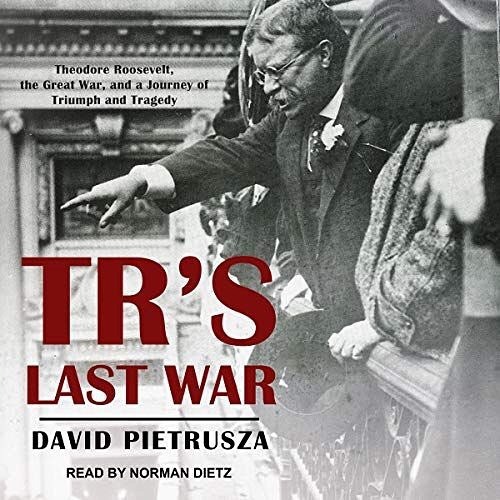
TR's Last War Theodore Roosevelt, the Great War, and a Journey of Triumph and Tragedy by David Pietrusza. Norman Dietz narrates this 13-hour #Audible American history book. A riveting new account of Theodore Roosevelt's impassioned crusade for military preparedness. America fitfully stumbles into World War I, punctuated by his unique tongue-lashings of the vacillating Woodrow Wilson. Do all heroes have feet of clay? (at Kennett Square, Pennsylvania) https://www.instagram.com/p/B2r4NRklgzn/?igshid=1gy1fmeim609o
0 notes
Note
have you read 1948 by David Peitrusa (sp?)?
I have read all of David Pietrusza's books and have been a big fan of his work for a long time. In fact, his publisher even used me as a blurb on at least the paperback editions of a couple of his books.
I'm particularly fond of Pietrusza's 1920: The Year of the Six Presidents (BOOK | KINDLE). It's a really great read and I remember breezing through it when I got it. My second favorite of his books is 1960: LBJ vs. JFK vs. Nixon: The Epic Campaign That Forged Three Presidencies (BOOK | KINDLE).
Like I said, I am a longtime fan of Pietrusza's writing style. He's written many books on a variety of subjects, but you especially can't go wrong with any of these books about the Presidents and Presidential elections:
•1932: The Rise of Hitler and FDR: Two Tales of Politics, Betrayal, and Unlikely Destiny (BOOK | KINDLE)
•TR's Last War: Theodore Roosevelt, the Great War, and a Journey of Triumph and Tragedy (BOOK | KINDLE)
•Roosevelt Sweeps Nation: FDR's 1936 Landslide and the Triumph of the Liberal Ideal (BOOK | KINDLE)
•1948: Harry Truman's Improbable Victory and the Year That Transformed America (BOOK | KINDLE)
#Books#History#Presidents#Presidential History#David Pietrusza#Book Suggestions#Book Recommendations#Presidential Elections#Books About Presidents#Politics#Presidential Politics#1920: The Year of the Six Presidents#1960: LBJ vs JFK vs Nixon#1932: The Rise of Hitler and FDR#TR's Last War#Roosevelt Sweeps Nation#1948: Harry Truman's Improbable Victory and the Year That Transformed America#Diversion Books#Lyons Press#Basic Books#Pietrusza#Rowman & Littlefield#Globe Pequot
9 notes
·
View notes
Link
5 notes
·
View notes
Note
have any book recommendations for things TLM related?
Girl, you know I do.
The Latin Mass Explained is my gold standard recommendation for getting into the TLM. Because it’s more than just different prayers than the NO, more than the “smells and bells,” although that’s part of it - the difference between the two is in the ground of their existence, in intent and purpose, in attitude towards the Church and to God. This book can give you a great sense of what the TLM is really all about. The first half of the book explains the true nature and character of the mass - sacrifice - which is required reading for everyone, no matter how much you think you know. It’s edifying and great to meditate on, even if it’s not “new information”. The second half walks you through the parts of the mass and what the sacred vessels, vestments, etc. are and how they’re used.
We use the Baronius Press missal, and love it, but a more economical option would be to get your own little red book, like what parishes provide in the pews. That way at least the ordinary and canon are at your fingertips, though not the propers.
Not a book, but: Ven. Fulton Seen has this great video where he walks the viewer through the traditional mass. There is, however, a book version in similar style, which can be found used fairly economically or through a library: This is the Mass, as described by Henri Daniel-Rops, as celebrated by Fulton J. Sheen, as photographed by Yousuf Karsh, trans. Alastair Guinan, with an introduction by Bishop Sheen (Hawthorn Books, 1959.) [Daniel-Rops is a significant Catholic historian and I highly recommend his books; I’m making my way through The Protestant Reformation right now.]
I wouldn’t recommend this for you personally just now, maybe in a few weeks, but everyone, absolutely everyone, ought to read The Heresy of Formlessness by Martin Mosebach at some point in their lives. I have extensive quotes from Mosebach in my tag if you want digestible samples, but context is key; everything he writes builds on what came before. Speaking of tags, where you’ll find links to good articles and other book titles, try latin matters and TLM.
I’ve mentioned to you before the pamphlet For the Visitor at Mass, which isn’t available anymore. I may just post pictures of the salient pages because it is a fantastic guide and I’m so mad it’s not out there anymore. (You can’t even get it used unless you want to lose an arm and a leg, and it’s just a pamphlet.)
I like Sursum Corda: Documents and Readings on the Traditional Latin Mass, from the Council of Trent to Benedict XVI’s Motu Proprio, edited by David Pietrusza.
For both books and online reading, Peter Kwasniewski is fantastic. He writes at New Liturgical Movement.
If you want a general sense of the importance of and attitude towards the “sacred signs” of the mass, from actions (like kneeling and striking the breast) to things (like candles and the sacred vessels) there’s a great little book from the 50s by Romano Guardini called Sacred Signs which gives a meditation for each action or thing. It’s really good reading. It helps give a sense of how the interior attitude and understanding of the TLM differs from the NO (without ever mentioning the NO at all because of course in the 50s it didn’t exist yet.)
If later on, you, or others, are interested in recommendations that get into the history of the NO and compare-and-contrasts with it and the TLM, I’ll do a follow-up post with more recs!
3 notes
·
View notes
Photo


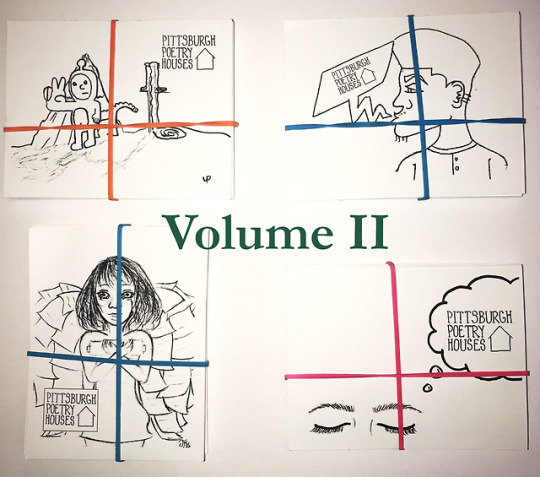
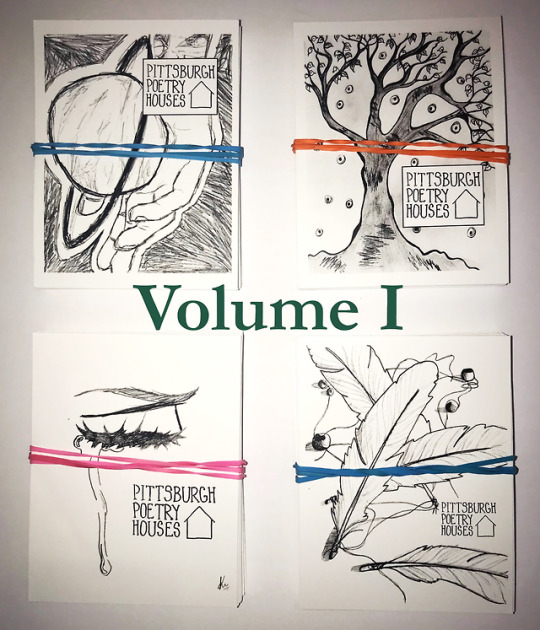
STORE: Buy Volume 1, Volume 2, Volume 3 or a bundle of all three!
To purchase any back volumes from the Pittsburgh Poetry Houses, please email [email protected].
Volume III: 40 poems printed individually on quarter sheets of card stock with an illustrated cover exclusive to the volume, all bound with a neon gumband.
Featuring poems by: Jessica Goodfellow, Lynn Wagner, Kas Leet, Jennifer Kulbeck, Andrea Janov, John Reinhart, Nsai Temko, Aimee Mackovic, Bria Davis, Abby Chew, Amy Lee Heinlen, Ralph Stevens, Jaila Brentley, Reed Redmond, Kevin Casey, Zachary Kluckman, Margaret Bashaar, Sidney Wollmuth, Frank Modica, Mike Good, Phyllis Wax, Josephine Squillante, Wendy Scott, Louise Robertson, Mercedes Lawry, Stephanie Malley, Barbara Ruth, Andrea Blythe, Ayame Hairston, Allison Adair, Ayesha Chatterjee, Malcolm Friend, Julie Marquez, Skylar T., Sharon Suzuki-Martinez, Nancy Reddy, paulA neves, J.L Von Ende, Kara Knickebocker, and Karen Rigby. Covers by: Albert Zhang, Madison Wise, Nsai Temko, and Robert Lehew.
Volume II: 32 poems printed individually on quarter sheets of card stock with an illustrated cover exclusive to the volume, all bound with a neon gumband.
Featuring poems by: Andrianne Dao, Lori Gravley, Karen Hart, Prerna Bakshi, Larisa Harriger, Ellene Glenn Moore, Ziggy Edwards, Zoe Stephan, Cameron Barnett, Alison Prine, Jeffrey Kuhn, Maria Davila, Sheila Squillante, Jennifer Hambrick, Sheila Wellehan, Shenu Kathymoon, Lisa Gluskin Stonestreet, Hannah Craig, Neely Woodroffe, Holly Burdorff, Maureen McGranaghan, Candice Geary, Laryssa Wirstiuk, Mike Yim, Laura Lovic-Lindsay, Bella Carlino, Eileen Murphy, Eric Paul Shaffer, Bruce Robinson, Judith R. Robinson, Gabriella Alexis, and Conrad Geller. Covers by: Hassan Rollins, Jazmirr Cook, Corinne Gamble, and Linus Pietrusza.
Volume I: 36 poems printed individually on quarter sheets of card stock with an illustrated cover exclusive to the volume, all bound with a neon gumband.
Featuring poems by: Angele Ellis, Anna Leahy, Arlene Weiner, Brianna Pike, Suzen Richardson, Daniel Blokh, David Forman, Ellen Kombiyil, Emily Nigra, Erin Taylor, Ethan Brouder, Farah Ghafoor, Jazlynn Houston, Jeff Hoffman, Jennifer MacBain-Stephens, Kelly Scarff, Lauren Bingham, Leah Mueller, Lori Wilson, Margot Douaihy, Marie Vibbert, Meghan Tutolo, Melissa Frederick, Michalle Gould, Miriam Bird Greenberg, Natalia Holtzman, Rachel Davis, Randi Ward, Robin Turner, Scott Thomas Outlar, Shannon Connor Winward, Shannon Sankey, Sherrell Wigal, Tamar Reed, Tammy Bendetti, and Timeka Thompson. Covers by: Suzen Richardson, Paige Norman, Khristian McLemore, and Paul Rusinko.
4 notes
·
View notes
Text
Book Recommendations: Da Big List, Non-Fiction Edition
(same disclaimer applies)
-The Seven Lives of Colonel Patterson: How an Irish Lion Hunter Led the Jewish Legion to Victory by Denis Brian. A slim biography of Colonel John Henry Patterson, a man who, among other things, led the hunt for not one but TWO man-eating lions, got involved in a scandal that inspired a story by Hemingway, and helped form what eventually evolved into the core of the Israeli Defense Force.
-The Dead Travel Fast: Stalking Vampires from Nosferatu to Count Chocula by Eric Nuzum. A fun little book in which the author tries to explore vampires in pop culture from every possible angle (at the time; it was written pre-Twilight); he goes on a tour of Transylvania, visits a Dark Shadows con, watches all of Buffy, reads Dracula and Anne Rice's Vampire Chronicles, plays Vampire: The Masquerade, works as a vampire at a haunted house, makes a noble effort to watch every vampire movie ever made, and more.
-Popular Crime: Reflections on the Celebration of Violence by Bill James. A somewhat weightier tome, in which the creator of sabermetrics turns his attention from studying baseball to studying murder, or at least the pop culture appreciation of murder. It's rather more entertaining than you'd expect, and includes lots of good stuff; my favorites are how he explains that it is simultaneously impossible for Lizzie Borden to have murdered her parents AND for anyone else to have done it, and the bit at the end when he suggests a novel approach to prison reform.
-The Devil in the White City: Murder, Magic, and Madness at the Fair That Changed America by Erik Larson. You've probably heard of this one, which explores the efforts to build the 1893 Chicago World's Fair and juxtaposes 'em with the crimes of serial killer H. H. Holmes in the same time and place.
-The Golden Age of Quackery by Stuart H. Holbrook. Everything you can ever want to know about the age of patent medicines is in this book.
-Sacred Monsters: Mysterious and Mythical Creatures of Scripture, Talmud, and Midrash by Rabbi Natan Slifkin. In this book, banned by several Haredi Rabbis, the author discusses various creatures mentioned in Jewish holy texts that are known not to exist and tries to figure out what it's talking about; was the term for a mundane creature mistranslated? was it a metaphor? or were the Sages of old mistaken?
-1920: The Year of the Six Presidents by David Pietrusza. A fascinating look at the US presidential race for 1920, in which, as the title notes, six men who were or would become President were majorly involved.
-The Ten-Cent Plague: The Great Comic-Book Scare and How It Changed America by David Hadju. A marvelous book that is exactly what is says on the tin.
-Gun Guys: A Road Trip by Dan Baum. In which a man who is somehow both a liberal and a gun-lover travels America exploring various facets of American gun culture. As close to an unbiased look on the subject you're liable to get, and fun besides.
-Triumph in a White Suburb: The Dramatic Story of Teaneck, N.J., the First Town in the Nation to Vote for Integrated Schools by Reginald G. Damerell. Exactly what it says on the tin. Admission; I have family in Teaneck (though they moved in much later), so my enjoyment of the book may have been skewed.
-Death in the City of Light: The Serial Killer of Nazi-Occupied Paris by David King. As it says, the tale of a serial killer who used the climate of fear created by the Nazi occupation of Paris to lure his victims and cover up his crimes, and afterwards tried to escape justice by claiming to be a resistance fighter.
-The Forger's Spell: A True Story of Vermeer, Nazis, and the Greatest Art Hoax of the Twentieth Century by Edward Dolnick. The tale of Dutch art forger Hans van Meegren, who's counterfeit Vermeers were only exposed when he was put on trial for selling one to Goering.
-Operation Mincemeat: The True Spy Story That Changed the Course of WWII by Ben Macintyre. The story of how British Intelligence used a corpse to convince the Nazis that the Allies were planning to invade Sardinia instead of Sicily.
-Charlemagne's Tablecloth: A Piquant History of Feasting by Nichola Fletcher. As the subtitle suggests, this book looks at feasting throughout history, exploring not only what people of different times and places chose to ate when they feasted and why, but the cultural activities that accompanied the eating.
-Longitude: The True Story of a Lone Genius Who Solved the Greatest Scientific Problem of His Time by Dava Sobel. Tells the story of the 18th Cenutry quest to create a reliable method of telling time at sea, and of John Harrison, the man whose invention of the chronometer solved the problem. The book was later re-released as The Illustrated Longitude, with a lavish array of photos and such, which is what I read.
-Why Did the Chicken Cross the World?: The Epic Saga of the Bird That Powers Civilization by Andrew Lawler. In which the origins of the world's most common barnyard fowl are explored and it's surprisingly powerful impact on history are explicated.
-Connections by James Burke. Written as companion to a 1978 TV documentary, this is a marvelous history of science and invention, showing how seemingly disparate discoveries and events led to many of the cornerstones of the modern world.
-A. J. Jacobs is a writer for Esquire magazine who will periodically spend a year doing...something, and then write a book about the experience, spiced up with interviews with relevant experts. I've read four of these books; they are vastly better than they have any right to be and I adore them. In order (seriously, read them in order, some of the best stuff is seeing what lifestyle changes stick between stunts), they are The Know-It-All: One Man's Humble Quest To Become the Smartest Person in the World (in which he reads the entire Encyclopedia Britannica); The Year of Living Biblically: One Man's Humble Quest To Follow The Bible As Literally As Possible (the subtitle is fairly self-explanatory); The Guinea Pig Diaries: My Life As An Experiment (a collection of shorter stunts, EG the time he impersonated a C-List movie star and crashed the Oscars, a week where he tried to live according to the precepts of Radical Honesty, stuff like that); Drop Dead Healthy: One Man's Humble Quest For Bodily Perfection (where he tries out a bunch of fad diets and exercise regimes and so forth); and It's All Relative: Adventures Up and Down the World's Family Tree (genealogy, the fact that ultimately everyone is related ot everyone else, which fact leads him to attempt to create a "Global Family Reunion")
-Moveable Feasts: From Ancient Rome to the 21st Century, the Incredible Journeys of the Food We Eat by Sarah Murray. A collection of essays that explores, of all subjects, the transportation of food. Ranging from ancient Roman amphorae to modern refrigerated shipping containers, and subjects as diverse as the influence of the grain elevators of Buffalo, New York on Bauhaus architecture, the logistics of the Berlin Airlift, and the science of making MREs.
-The Fortune Cookie Chronicles: Adventures in the World of Chinese Food by Jennifer 8 Lee (no, that's not a typo, her middle initial is the number eight). This is another one of those "layman author looks at a particular subject from a wide array of angles" books that I'm so fond of. In this case, as the title suggests, the subject is Chinese food, ranging from investigating the true origins of the fortune cookie and discovering who the hell General Tso was to documenting how running a Chinese restaurant caused one immigrant family to disintegrate and delving into the Great Kosher Duck Scandal of 1989.
-Kosher Nation: Why More and More of America's Food Answers To A Higher Authority by Susie Fishkoff. And speaking of Kosher food, that's the subject here. I admit to being somewhat biased for obvious reasons, but this is actually a really interesting subject, and there's a lot of ground here for Fishkoff to cover; the Agriprocessors scandal, the current "kosher revival" in the Reform and Conservative movements, the intersection of Jewish kashrut and Islamic halal, the sometimes surprisingly cutthroat competition between kosher certification agencies, not to mention the nitty-gritty details of being a kashrut supervisor from the Midwest to China.
-Brainiac: Adventures in the Curious, Competitive, Compulsive World of Trivia Buffs by Ken Jennings. After achieving national prominence for having the longest winning streak in the history of the game show Jeopardy!, Ken Jennings was naturally paid to write a book about it. Rather than simply produce a memoir of his experience, he decided to explore the world of trivia in general. The result is thoroughly entertaining, and of course introduces one to loads of fascinating, if useless, information. He later went on to write Maphead: Charting the Wide Weird World of Geography Wonks, which is equally entertaining.
-Supergods: What Masked Vigilantes, Miraculous Mutants, and A Sun God from Smallville Can Teach Us About Being Human by Grant Morrison. This one's actually a bit difficult to define; it's partially a history of superhero comics, partially the autobiography of an acclaimed comics writer, and partially a somewhat rambling philosophical interrogation of superhero comics. It's great fun AND makes you look at certain aspects of superherodom in new ways.
-Storm Kings: The Untold History of America's First Tornado Chasers by Lee Sandlin. This book chronicles the long and twisted path of tornado research. While it starts with the first documented cyclones of colonial America, the bulk of the text is taken up covering the great scientific debates of the early and mid 19th century over the nature of tornadoes. Men long forgotten, such as Espy, Hare, and Redfield are brought back to life, along with their bitter rivalries. Later sections on the efforts of the Army Signal Corps to predicate tornadoes and of the political battles on the nature of weather forecasting are equally fascinating, though are cut somewhat short - I really wish the book lasted a bit longer. Either way, Storm Kings was a truly great look at a little-known facet of history. (NOTE: This review was originally written by Alamo, but I second every word)
-The Inventor and the Tycoon: A Gilded Age Murder and the Birth of Moving Pictures by Edward Ball. You've probably heard of the story about how the motion-picture was invented, and how it involved a bet made by the Governor of California on how horses galloped. However, the tale of Eadweard Muybridge, the actual inventor, is often ignored, or glossed over. As one reads this book, the reasons for that become increasingly clear. Ball chronicles the long and twisted journey that brought Muybridge from his native Britain to the wild west, and the then-famous murder he committed. (NOTE: This review was also originally written by Alamo, but again I completely agree)
-Priceless: How I Went Undercover to Rescue the World's Stolen Treasures by Robert K. Wittman. This is an inside look at the FBI's efforts to recover rare pieces of art and antiquities. (NOTE: This one was also one of Alamo's, etc.)
-The Secret History of Wonder Woman by Jill Lepore. A fascinating biography of William Moulton Marston, the idiosyncratic creator of the world's most famous superheroine. Really fascinating stuff.
-Banquet at Delmonico's: Great Minds, the Gilded Age, and the Triumph of Evolution In America by Barry Werth. The story of how the theory of evolution became accepted a smainstream by the American elite, and the corollary origins of Social Darwinism.
-Engines of Change: A History of the American Dream in Fifteen Cars by Paul Ingrassia. Honestly, the subtitle is fairly self-explanatory.
-The Great Detective: The Amazing Rise and Immortal Life of Sherlock Holmes by Zach Dundas. This is another one of those "layman author looks at subject from multiple angles" books, that I'm so fond of. Very well written, occasional insightful, and with lots of cool trivia.
0 notes
Text
“The political mind is the product of men in public life who have been twice spoiled. They have been spoiled with praise and they have been spoiled with abuse. – Calvin Coolidge”
“The political mind is the product of men in public life who have been twice spoiled. They have been spoiled with praise and they have been spoiled with abuse. – Calvin Coolidge”
“The political mind is the product of men in public life who have been twice spoiled. They have been spoiled with praise and they have been spoiled with abuse. – Calvin Coolidge” – David Pietrusza, 1960–LBJ vs. JFK vs. Nixon: The Epic Campaign That Forged Three Presidencies
View On WordPress
0 notes